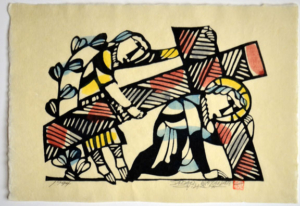Good Friday Sermon
On the Friday we call Good
The Rev. Mark Sutherland
Cover picture Christ Carries His Cross, Sadao Watanabe
Our commonality with Jesus – is that like him – we too know sorrow and are acquainted with grief. He treads his road, a road he nevertheless chooses to accept – and like us, he knows little more than what is revealed as he takes each step putting one foot in front of the other, one breath at a time.
The lyrics quoted in the text are from Bette Midler’s The Rose
Some say love it is a river that drowns the tender reed,
some say love it is a razor that leaves your soul to bleed,
some say love it is a hunger an endless aching need.
I say love, it is a flower, and you its only seed. ….
Love hurts and our hearts have an all too familiar affinity with suffering. Yet, if we dwell on suffering, we are in danger of being little more than mere bystanders – spectators of Jesus’ suffering on his way to the Cross.
It’s so easy to stand and watch from a safe distance – comforted by an image of Jesus as the noble hero valiantly travelling the route God has set for him – seemingly heedless of the costs because after all – he has the comfort of knowing ahead of time how things will end – or that’s the way we like to view him.
But we must go deeper than this if we are to move from spectators to participants with Jesus in his Passion. This requires us to choose a different focus – viewing him through a different lens.
We need Jesus to be more like us than not. We are not noble heroes passing through the drama of our lives unscathed. Walking with Jesus on the Via Dolorosa – his road of sorrows – we need to reconnect with the pain of our own losses and sorrows. When we do so – we do not imagine ourselves to be heroes, somehow valiantly marching on – unscathed. We do not imagine our own suffering to be heroic. Suffering is only heroic when it is viewed from outside – through the lens of the onlooker.
Our commonality with Jesus – is that like him – we too know sorrow and are acquainted with grief. He treads his road, a road he nevertheless chooses to accept – and like us, he knows little more than what is revealed as he takes each step putting one foot in front of the other, one breath at a time.
As onlookers of his Passion – what do we feel? Maybe admiration for someone who has more courage than we; maybe gratitude – as if his suffering has relieved us of the necessity of ours. If this is all, then we fail to see that the way of the Cross is God’s invitation to become transformed not by suffering, but by the power of love. Jesus is no noble victim – coerced into sacrificing his life for the sins of the world. Jesus chooses to tread not the road of suffering but the road of God’s transforming love.
The Way of the Cross requires of us nothing short of a transformation in our whole (moral, emotional, and spiritual) way of being. In Jesus, God’s hands get dirty as Jesus takes the initiative and leads us through example. Our acceptance, our entry into the way of love involves risking as Jesus risked. Risk is the raw material for transformation, for:
It’s the heart afraid of breaking, that never learns to dance
It’s the dream afraid of waking, that never takes the chance
It’s the one who won’t be taken, – who cannot seem to give
And the soul afraid of dying, that never learns to live …
Entering into the way of love leads us to more than a new perspective on our own suffering. Entering into the way of love leads us to a new perspective on the world’s suffering. When we enter into solidarity with the suffering of others – those near us – our neighbors, our family and friends; when we feel a connection with the suffering of those far from us – unseen by us except through the screens of our TV’s or online – we cannot remain unmoved by the necessity of love. For us as a community, the way of love means uncovering and facing-down the cosmic forces of dehumanization woven into the very DNA of our culture and our collective memory. It means risking loving and taking hurt’s risk.
Entering upon the way of love – above all else means accepting an invitation to become transformed into a new way of seeing – transformed by a new way of being, one step at a time – transformed from timid and grateful onlookers – into willing collaborators with God in the vision of putting the world to rights.
From mere spectators to active participants with Jesus on the road to the cross is a movement through belonging-into-believing; a movement from fear-into-loving – from protected isolation into being loved.
This is not a hero’s path. Jesus shows us that it is a very human path. On the Friday we call Good, God shows us the way of love, motivated not by an abhorrence of sin, but by the necessity to love – for God – the impossibility is of not loving enough!
When the night has been too lonely and the road has been too long
And you think that love is only for the lucky and the strong
Just remember in the winter, far beneath the bitter snows
Lies the seed, that with the sun’s love in the spring becomes the rose.

